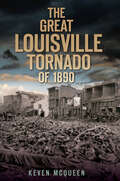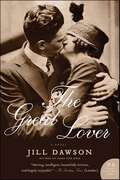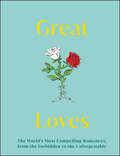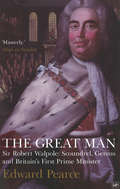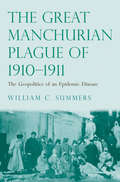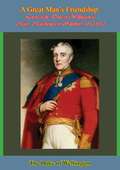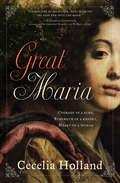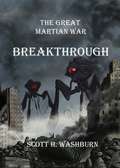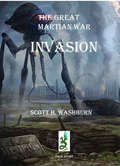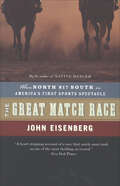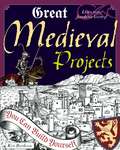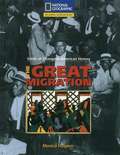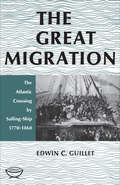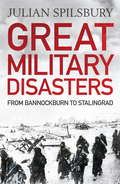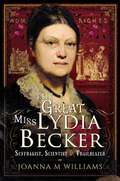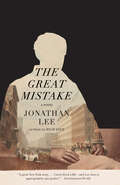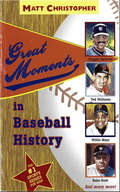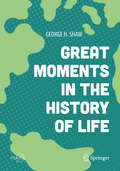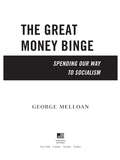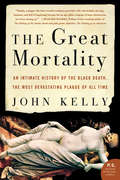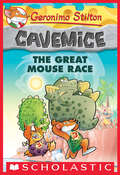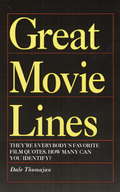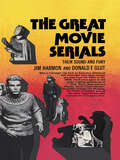- Table View
- List View
The Great Louisville Tornado of 1890 (Disaster Ser.)
by Keven McQueenThe dramatic story of a devastating natural disaster in nineteenth-century Kentucky. On March 27, 1890, a devastating storm moved over the Ohio River Valley, spawning dozens of deadly tornados. The most powerful of these twisters touched down in Louisville, carving a path of unprecedented destruction from Main Street to the end of town. In the aftermath, nearly eight hundred buildings in the city were destroyed, and over one hundred people perished. In all, the storm produced over twenty-five tornados that day, and it remains the twenty-fifth deadliest storm in US history. This book chronicles Louisville&’s most violent natural disaster, with tales of harrowing rescues and rebuilding.
The Great Lover: A Novel
by Jill Dawson“A brilliant, complicated man is the centre of Jill Dawson’s The Great Lover, and while she draws extensively on historical records of Brooke and his contemporaries, it is her decisions as a novelist that make this account of his life fascinating as well as faithful. . . . . The story that emerges is strong, satisfying, and memorable.” — The Times (London)An imaginative, fascinating novel about one of the most enduringly popular and romantic figures of the First World War—the radical, handsome young poet Rupert Brooke.
Great Loves (DK Secret Histories)
by DKCelebrate the greatest love stories that have molded the course of history!Romance in its many shapes and forms is celebrated around the world. It is a constant act of affection shown irrespective of age, race, gender or background, and is one way in which we show our humanity.This beautiful visual guide reveals the most passionate and tragic love tales throughout the centuries from people all over the world and includes: • Profiles stories of love and lovers throughout history, from the best-known — like Mark Antony and Cleopatra, Napoleon and Josephine, and John Lennon and Yoko Ono — to less famous but equally powerful examples, like Hadrian and Antinous, Anne Lister and Ann Walker, and Mildred and Richard Loving • Specially commissioned illustrations that represent the individuals involved, with images of letters, paintings and artifacts that tell the story of each love affair • Quotes from love letters, poems, songs and stories by the featured individuals, or about their relationship • Diverse LGBTQ+ love stories, such as Emperor Ai of Han and Dong Xian; Virginia Woolf and Vita Sackville-West; Lili Elbe and Gerda Wegener; and Eleanor Roosevelt and Lorena Hickok Mark Antony's love for Cleopatra led to war between Rome and Egypt, Emperor Xuanzang of Tang relinquished the Mandate of Heaven for Yang Guifei, and the English Reformation was borne out of Henry VIII's passion for Anne Boleyn. These great loves and many others have been celebrated, recorded and forever memorialized to chronicle the wars, peace treaties and politics of our modern world.This inspirational book about love also delves into the popularity of real love stories. It features columns, podcasts and TV shows like the NYT Modern Love column, theappetite for love letters, and the timeless popularity of love and romance with reality-TV programs like Love Island, First Dates and The Bachelor/Bachelorette. This is the perfect purchase for a Valentine&’s Day gift or any other special occasion for anyone interested in history, culture and literature. Most importantly, readers who want to learn about relationships that have challenged conventions, the history of LGBTQ+, lovers of romance and trivia, and general knowledge fans.
The Great Man: Sir Robert Walpole: Scoundrel, Genius and Britain's First Prime Minister
by Edward PearceThe year 1721 has many splendours: great houses built by William Kent, fine pictures and the fruits of commerce. But there are also thirteen public hanging days a year, drunkenness is endemic, organised crime rampages through the streets. And politics are ferocious. Only a generation earlier, The Pretender failed to take the Crown; the new King is cursed as a damned foreigner; James's followers - the Jacobites - conspire and are persecuted; the South Sea Bubble collapses.Robert Walpole, once imprisoned for financial chicanery, assumes political control and becomes 'Prime Minister'. He personally detects a Jacobite plot, is dismissed in 1727 on the death of George I, recruits the new King's clever wife, Caroline, and bounces cheerfully back. Coarse, corrupt and cynical, Walpole dominates King, Parliament and Government until 1742. This is Mr Worldywiseman, keeping England out of war for twenty years and setting up a stable and growing economy. All politics of a kind we can recognise today begin with Robert Walpole. And here, in Edward Pearce's elegant book, he is brought vividly back to life.
The Great Manchurian Plague of 1910-1911
by William C. SummersWhen plague broke out in Manchuria in 1910 as a result of transmission from marmots to humans, it struck a region struggling with the introduction of Western medicine, as well as with the interactions of three different national powers: Chinese, Japanese, and Russian. In this fascinating case history, William Summers relates how this plague killed as many as 60,000 people in less than a year, and uses the analysis to examine the actions and interactions of the multinational doctors, politicians, and ordinary residents who responded to it. Summers covers the complex political and economic background of early twentieth-century Manchuria and then moves on to the plague itself, addressing the various contested stories of the plague's origins, development, and ecological ties. Ultimately, Summers shows how, because of Manchuria's importance to the world powers of its day, the plague brought together resources, knowledge, and people in ways that enacted in miniature the triumphs and challenges of transnational medical projects such as the World Health Organization.
A Great Man’s Friendship: Letters of the Duke of Wellington to Mary, Marchioness of Salisbury, 1850-1852
by Lady Burghclere The Duke of WellingtonOriginally published in 1927 and edited by Lady Winifred Anne Henrietta Christiana (Herbert) Burghclere, this book is a collection of the Duke of Wellington's letters to one of his regular correspondents and friend, Mary Catherine Gascoyne-Cecil, Marchioness of Salisbury. The letters in this volume cover the years 1850-1852--the last two years of the Duke of Wellington's life. It ends with the Duke's final note dated September 13, 1952, the eve of his death."The Duke's actions were sometimes mistaken, his judgments sometimes faulty, but the advocatus diaboli can find nothing to challenge in the limpid sincerity of his selfless motives. In these letters, too, the man's kindliness, the "good nature" he proclaimed as so important an ingredient, even in public affairs, is markedly apparent."It is also an illustration of the force of willpower to see an octogenarian able to put through the business which every day brought him. He might grumble that "every animal but the Duke of Wellington is allowed a rest," but the myriad tasks, the countless courtesies and kindnesses, were achieved largely by his lifelong system "to do the business of the day in the day."It is therefore to be hoped that the perusal of these letters will give their readers a more intimate acquaintance with one whose whole career and character must be a source of pride to those of his own race."Illustrated with Portraits.
Great Maria
by Cecelia HollandCourage of a king, Strength of a knight, Heart of a woman"A literary phenomenon. "-New York TimesHer father is a robber baron. . . Her husband has grand ambitions and a quick temper. . . She will become. . . the Great Maria. A lush portrait of the eleventh century that leaves out none of its harshest nature, Great Mariais Cecelia Holland at her most evocative. A mere fourteen years old, strong-willed Maria is betrothed to Richard. Theirs is a marriage of conflict, yet one that grows over the years into respect and partnership. As they struggle-at times against each other, at times side-by-side-Maria and Richard emerge as full-blooded characters you'll never forget. What Readers Are Saying"Holland's characters are so complex and vividly drawn that the reader actively participates in their adventures. ""An intriguing plot, unforgettable characters, and a wonderful sense of place makes this one of the finest books I have read. ""If Hemingway had written historical fiction, he would have had a hard time beating Ms. Holland. Her terse, tense writing style is incomparable, and her character development is superb. ""A stunning book. ""Characters so believable, they walk off the page and into the room. Few authors can bring the past to life as powerfully as Cecelia Holland. I'd recommend her to any fans of historical fiction. "-Elizabeth Chadwick, author of The Greatest Knightand To Defy a King"This novel's success is assured by its own excellence. "-Library Journal"One of the very best historical novelists of our day. "-Larry McMurtry
Great Maria
by Cecelia HollandCourage of a king, Strength of a knight, Heart of a woman "A literary phenomenon." -New York Times Her father is a robber baron... Her husband has grand ambitions and a quick temper... She will become...the Great Maria. A lush portrait of the eleventh century that leaves out none of its harshest nature, Great Maria is Cecelia Holland at her most evocative. A mere fourteen years old, strong-willed Maria is betrothed to Richard. Theirs is a marriage of conflict, yet one that grows over the years into respect and partnership. As they struggle-at times against each other, at times side-by-side-Maria and Richard emerge as full-blooded characters you'll never forget.What Readers Are Saying "Holland's characters are so complex and vividly drawn that the reader actively participates in their adventures." "An intriguing plot, unforgettable characters, and a wonderful sense of place makes this one of the finest books I have read." "If Hemingway had written historical fiction, he would have had a hard time beating Ms. Holland. Her terse, tense writing style is incomparable, and her character development is superb." "A stunning book." "Characters so believable, they walk off the page and into the room. Few authors can bring the past to life as powerfully as Cecelia Holland. I'd recommend her to any fans of historical fiction." -Elizabeth Chadwick, author of The Greatest Knight and To Defy a King "This novel's success is assured by its own excellence." -Library Journal "One of the very best historical novelists of our day." -Larry McMurtry
The Great Martian War: Breakthrough
by Scott WashburnThe Battle for Earth continues! The merciless invaders from the Red Planet have entrenched themselves all over the world, but President Theodore Roosevelt and the men of the US Army and Navy are focused on the aliens threatening the American heartland. As forces are rushed to meet the invader, science and industry race to build the weapons needed to match the fantastic machines of the aliens. But not all is well with the Martians as they struggle to adapt to a new world. The lines are drawn as each side prepares for what they hope will be the decisive battle. This is the second book in the first trilogy of The Great Martian War.
The Great Martian War: Invasion! (The\great Martian War Ser. #1)
by Scott WashburnFollowing the defeat of the Martian invasion of Britain, a new threat to humanity lands in the American west. President Roosevelt musters the captains of industry and leading scientists to find a way to turn back the Martian tide
The Great Match Race: When North Met South in America's First Sports Spectacle
by John EisenbergThe Great Match Race is a captivating account of America's first sports spectacle, a horse race that pitted North against South in three grueling heats. On a bright afternoon in May 1823, an unprecedented sixty thousand people showed up to watch two horses run the equivalent of nine Kentucky Derbys in a few hours' time. Eclipse was the majestic champion representing the North, and Henry, an equine arriviste, was the pride of the South. Their match race would come to represent a watershed moment in American history, crystallizing the differences that so fundamentally divided the country. The renowned sportswriter John Eisenberg captures all the pulse-pounding drama and behind-the-scenes tensions in a page-turning mix of history, horse racing, and pure entertainment.
Great Medieval Projects
by Kris Bordessa Shawn BraleyGreat Medieval Projects You Can Build Yourself brings the Middle Ages in Europe alive through hands-on activities for kids ages 9-12. Addressing various aspects of medieval life, this book provides historically accurate details of the period leading up to the Renaissance. From monastic life to castle living, villages to towns, each section offers a glimpse into the daily existence of the people who lived in medieval Europe. Sidebars and fun trivia break up the text. Readers will expand their knowledge of this era beyond knights, fair maidens, and castles as they learn about siege warfare, life in a medieval village, medieval clothing, markets and fairs, the Plague, medieval medicine, and the Crusades.
The Great Migration: African Americans Move to the North, 1915-1930 (Nonfiction Reading and Writing Workshops)
by Monica Halpern National Geographic Learning StaffFrom 1915 to 1930, hundreds of African Americans migrated from the South. This is the story of why they left, how they adapted to city life, and how they changed American society.
The Great Migration (Second Edition)
by Edwin GuilletHere is a record of one of history's great migrations, the Atlantic Migration to the New World, especially from 1770 to 1890, when eleven million people came from the British Isles to North America. The slow crossing by sailing ship was unpleasant even in the best accommodation, but for the poor conditions were wretched in the extreme. Famine, unemployment, poverty drove many from the Old World, and their desperate circumstances made them vulnerable to exploitation at both ends of the journey. In the New World, the immigrant had to adjust to strange conditions as he ventured into the interior of the continent to enter upon the hardships of pioneering. Mr. Guillet has located records never before consulted, found contemporary descriptions not previously used, and presented excerpts from diaries, narratives, letters, and emigrant guidebooks formerly accessible only in museum and archives collections. The illustrations are all from contemporary sources and provide in themselves an authentic and comprehensive picture of the times.
Great Military Disasters: From Bannockburn to Stalingrad
by Julian SpilsburyGreat Military Disasters tells the dramatic stories behind the world's most calamitous conflicts. From the French army's failure to understand the impact of new technology at Crécy to Hitler's blatant overconfidence at Stalingrad, military historian Julian Spilsbury provides thrilling accounts of each disaster, covering exactly what went wrong, how and why. Of course, a disastrous outcome for one side meant victory for another, so as well as exploring the reasons the conflict ended in disaster, Great Military Disasters also reveals the key to victory. Eyewitness quotations add another dimension to this intriguing study of human incompetence of the gravest kind.
Great Military Disasters: From Cannae To Stalingrad
by Julian SpilsburyGreat Military Disasters tells the dramatic stories behind the world's most calamitous conflicts. From the French army's failure to understand the impact of new technology at Crécy to Hitler's blatant overconfidence at Stalingrad, military historian Julian Spilsbury provides thrilling accounts of each disaster, covering exactly what went wrong, how and why. Of course, a disastrous outcome for one side meant victory for another, so as well as exploring the reasons the conflict ended in disaster, Great Military Disasters also reveals the key to victory. Eyewitness quotations add another dimension to this intriguing study of human incompetence of the gravest kind.
The Great Miss Lydia Becker: Suffragist, Scientist & Trailblazer
by Joanna M. WilliamsFifty years before women were enfranchised, a legal loophole allowed a thousand women to vote in the general election of 1868. This surprising event occurred due to the feisty and single-minded dedication of Lydia Becker, the acknowledged, though unofficial, leader of the women's suffrage movement in the later 19th century. Brought up in a middle-class family as the eldest of fifteen children, she broke away from convention, remaining single and entering the sphere of men by engaging in politics. Although it was considered immoral for a woman to speak in public, Lydia addressed innumerable audiences, not only on women's votes, but also on the position of wives, female education and rights at work. She battled grittily to gain academic education for poor girls, and kept countless supporters all over Britain and beyond abreast of the many campaigns for women's rights through her publication, the Women's Suffrage Journal. Steamrollering her way to Parliament as chief lobbyist for women, she influenced MPs in a way that no woman, and few men, had done before. In the 1860s the idea of women's suffrage was compared in the Commons to persuading dogs to dance; it was dismissed as ridiculous and unnatural. By the time of Lydia's death in 1890 there was an acceptance that the enfranchisement of women would soon happen. The torch was picked up by a woman she had inspired as a teenager, Emmeline Pankhurst, and Lydia's younger colleague on the London committee, Millicent Fawcett. And the rest is history.
The Great Mistake: A novel
by Jonathan LeeAn exultant novel of New York City at the turn of the twentieth century, about one man's rise to fame and fortune, and his mysterious murder—&“riveting, immersive...an unparalleled feat of elegance and craftsmanship&” (Stephanie Danler, author of Sweetbitter).Andrew Haswell Green is dead, shot at the venerable age of eighty-three, when he thought life could hold no more surprises. The killing—on Park Avenue in broad daylight, on Friday the thirteenth—shook the city.Born to a struggling farmer, Green was a self-made man without whom there would be no Central Park, no Metropolitan Museum of Art, no Museum of Natural History, no New York Public Library. But Green had a secret, a life locked within him that now, in the hour of his death, may finally break free.A work of tremendous depth and piercing emotion, The Great Mistake is the story of a city transformed, a murder that made a private man infamous, and a portrait of a singular individual who found the world closed off to him—yet enlarged it.
Great Moments in Baseball History
by Matt ChristopherCapturing the suspense and play-by-play action of nine major league plays and the personalities of the athletes that made them, a fan's treasury includes Willie May's 1954 World Series catch and Jim Abbott's no-hitter.
Great Moments in the History of Life (Springer Praxis Books)
by George H. ShawA non-technical (but serious) treatment of those parts of Earth history leading up to human history, as well as some pre-historical aspects of humanity. Many “events” in Earth’s history necessarily preceded the emergence of human beings (and intelligence). Geology has provided us with a great deal of information about these various steps on the way to intelligent life, and how and why they were important. Some of these events were on a cosmic scale (no universe – no life!), some were planetological/astronomical (no Earth – no life), some were essentially chemical (how did life emerge in the primordial ocean and why do we have oxygen in the atmosphere?), and some were details of evolutionary history (how did life colonize the land and how did mammals develop?). In this book an enthusiastic professor of geosciences presents a broad introduction from the Big Bang to the present and into the future, lucidly explaining aspects from various disciplines to interested, non-specialist readers.
The Great Money Binge: Spending Our Way to Socialism
by George MelloanPrestigious newspaper editor George Melloan, who worked for The Wall Street Journal for more than half a century, is no stranger to the wild ups and downs of the American and world economies. This brilliantly argued book explains -- using detailed examples from the Crash of 1929 and from the Carter era -- how government intervention actually prevents the economy from recovering its natural balance. Unless lawmakers realize the true importance of using supply-side economics in our current crisis, warns Melloan, nothing will save us from a new era of disastrous inflation and widespread global depression. Citing the importance of historical example, Melloan explains how the world of economics was completely changed in the 1930s under the influence of English economist John Maynard Keynes. His theories advocating government interventionist policies were wholeheartedly adopted as a response to the Great Depression, and remained unquestioned until the "supply-side revolution" of 1980, after the stagflation of the 1970s showed the inherent weaknesses of neo-Keynesian economics. By employing what is sometimes called "Reaganomics," President Ronald Reagan and his economic advisers sparked a quarter century of unparalleled prosperity. Unfortunately, as Melloan demonstrates, government policy soon began to revert to Keynesian theories, even though they are widely misunderstood and misapplied. Now, with the Crash of 2008, our new president and government appear committed to ignoring the lessons of the past. With multibillion-dollar "stimulus packages" becoming the norm, and a multitrillion-dollar national debt that will keep growing so long as present policies are continued, America can look forward to a very grim future indeed. There is only one solution: we must return to our eroded supply-side principles. In the face of general misunderstanding, the vastly experienced Wall Street Journal editor George Melloan outlines a lucid and detailed explanation of exactly why we are currently sinking so rapidly, how this crisis compares to similar situations in the past, and exactly what must be done to return the United States to the economic vitality it enjoyed not so long ago.
The Great Mortality: An Intimate History of the Black Death, the Most Devastating Plague of All Time
by John KellyA compelling history of the Black Death that scoured Europe in the mid-14th century killing 25 million people. It was one of the worst human disasters in history.
The Great Mouse Race (Geronimo Stilton Cavemice #5)
by Geronimo StiltonGeronimo Stilton's ancient ancestor Geronimo Stiltonoot is back in another prehistoric adventure!It's time for the Stone Age Games, the annual cavemouse sports competition! This year, the saber-toothed tigers want to enter the games, too, so they call a truce. But when their flag goes missing, Tiger Khan blames the cavemice! Can Geronimo track it down in time to keep his fur intact?
Great Movie Lines
by Dale Thomajan"You must remember this . . . " A kiss is just a kiss, but famous movie lines last forever, and many have become permanently part of American culture. For silver-screen fanatics and current blockbuster buffs, GREAT MOVIE LINES collects and strings together the best of them into the longest and most famous scene of all time. Test your power of recall and challenge your friends. Then fasten your seatbelts, it's going to be a bumpy night!
